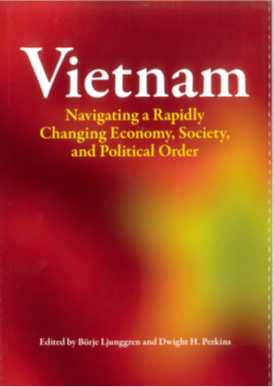Vietnam: Navigating a Rapidly Changing Economy, Society, and Political Order

After decades of war and economic stagnation, Vietnam has gradually become a more important actor in the international economic and political arena. A recent book from Harvard University’s Asia Center – Vietnam: Navigating a Rapidly Changing Economy, Society, and Political Order, edited by Börje Ljunggren and Dwight Perkins – brings together a group of leading European, North American, and Vietnamese scholars who have been following various aspects of the nation’s development for many years. The book focuses on how the country’s governance shapes its politics, economy, social development and relations with the outside world, and the reforms required if Vietnam is to become a sustainable and modern high-income nation in the coming decades.
In one of the book’s 17 chapters, entitled “FDI in Vietnam: Policies, Effects, and Linkages to the Local Economy”, Ari Kokko and co-authors Curt Nestor and Le Hai Van discuss the role of FDI in Vietnamese development. Thanks to a combination of market-oriented reforms, low wages, and relative political stability, Vietnam has become an attractive production location for thousands of multinational enterprises. The inflows of foreign capital and technology have created millions of jobs, and raised hopes that FDI will generate positive spillover effects that help Vietnam become a high-income country. However, one of the key findings of the chapter is that few domestic Vietnamese firms collaborate closely with the largest foreign investors, and that the productivity spillovers to local industry have been limited. To optimize the impact of FDI, it will be necessary to improve the business environment and strengthen the capabilities of local firms, so that they will be able to become active and dynamic participants in the global value chains that already operate in Vietnam. This is also necessary to ensure that Vietnam’s attractiveness as an investment location does not disappear with the increases in incomes and labor costs that are expected in the coming decade.
The contribution of Ari Kokko has been supported by Danida project grant 19-M05-CBS.